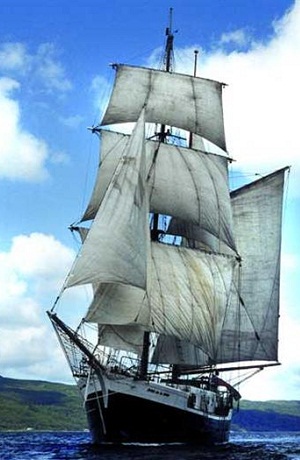The ship of state
 Whoever it was that first coined that phrase, had it right.
Whoever it was that first coined that phrase, had it right.
The State is like a ship, constructed of the best materials available, to perform a specific purpose, and able to perform that purpose, out on the trackless deeps. An island, able to navigate, with purpose, to its destination; a known place, or an as-yet unknown one. Able to survive, whatever the forces of nature have to throw at it, as well as whatever the forces of human-failing have to put in its way.
Cannons line its gunwhales. Copper sheathes its keel. Tar protects its rigging, and order directs its crew.
The ship is complex, and no one man may sail it alone. Many are needed, each with a specific task to perform. The tasks are varied and unlike each other, thus those who perform them must be specialized to those tasks.
Certain tasks require several to carry them out. Others, only one. No one person runs everything, but one must organize the many.
The Captain. He is not arbitrarily chosen: a popularity contest will not suffice. He must know his business, and be seen to know it. He must be an organizer, a diplomat, a decision-maker, and – sometimes – a tyrant. He orchestrates and executes. Yet he does not run the ship.
There must be a sailing-master: his job is to make sailing decisions, based upon his expertise in sailing. He knows the ship, knows the weather, and knows what he can, and can not do with these elements.
There is a bosun, a coxswain, a navigator, lieutenants and midshipmen. Yard-men, top-men, helmsmen. lookouts, and carpenters.
Many men, advised by a few, and led by only one. Cooperating to run this Ship.
At the peak, is the crow’s nest; in it a lookout: a seer, a primary navigator, a feeder of information to the Captain’s decisions. Who then confers with the sailing-master, and the lieutenants. Thus their decisions are arrived at, cooperatively. Yet one man decides.
The weather rules all. This is non-negotiable. The sailing-master does not set his suit of sails as if the weather were something it is not: he is advised by the weather, itself. The yard-men are called, along with hands at the running-rigging.
Courses, lower and upper. Top-gallants, perhaps. Royals, even sunsails, if all is well. Fishermen, mizzen, mizzen-top and staysails…
Orchestrated, these things happen, depending upon conditions, which are non-negotiable.
There is a language of government, here: unfamiliar to those who do not govern: Stays, tops, catheads and martingales. Brides and shrouds. Clews and luffs. Hard-about and helm-a-lee. Calm and ordered, purposeful and swift.
Thus the Ship, of sea, or land, is piloted.
The ship is ordered from inside to outside. The hull keeps out the sea. The copper keeps out the worms. The cannons keep out the pirates.
The captain keeps out the chaos, aided by his lieutenants and men-at-arms. The ship’s company are comrades, pulling for a common cause. They may not all like each other, but this is not a factor in the complex cooperation. It is in no way necessary to the operation of the Ship.
The sailing-master may override the Captain, to a point, in exceptional circumstances, and this is understood.
Coming into harbor under full sail is to be discouraged, even though it looks mighty good to onlookers.
The Ship has enormous momentum, and comes without brakes.
Likewise: laying rubber when getting underway is seldom a good plan, since the Ship’s inertia equals its momentum.
Balance, patience, and foresight, all contribute to safe and effective running of the Ship.
There may be passengers, who pay their way, thus helping to finance the ship. There may be cargo, to make this Ship pay. Lastly, there may be ballast, to keep the Ship to its marks, neither under, or overloaded.
Passengers who do not intend to pay, are discouraged, as well as excessive ballast, in the form of dead-weight bodies who perform no other useful purpose at all.
Every part, every crewmember, each piece of cargo, and every living body, has its part to play, and must exist for the Ship to sail.
Too much ballast: the Ship will sink.
Too much cargo, or too many passengers, and the result will be the same.
Too few lookouts, an irresponsible Captain, a sailing-master that bluffed his way into the job: same result.
The Ship of State is a Ship, indeed. It must be seen that way, for reason to prevail.
Order. Rules. Discipline. Steady Leadership. Adaptability to the forces of Nature. Cooperation.
All these things are necessary, and provide the desired result: Satisfaction in another successful voyage.









